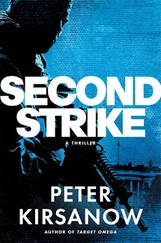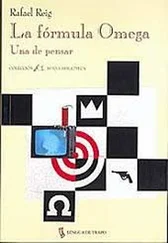The secretary of state lowered his head to conceal a whisper of a smile. A rebuke to the great Brandt, apparently trapped in an inconsistency.
“Mr. President,” Brandt responded, “I just think—”
Marshall interrupted. “Based on everything you said, I can’t believe the Russians would take the chance of hitting us with an EMP. It’s much more likely that this Ari Singer is wrong, or was misunderstood by Garin.”
“But, Mr. President,” Brandt said, but he was waved off by Marshall.
“Let me finish, Jim. In my experience the simplest explanation is usually the right one. It seems to me that an EMP strike is, in fact, going to happen. But it’s not going to be a Russian EMP strike on the US. Instead, it’s going to be an Iranian EMP strike, maybe with Russian help, against Israel.”
Marshall scanned the room for concurrence. The secretary of state leapt.
“My point exactly, Mr. President. Let’s not forget the obvious, what’s been going on in front of our noses the last few weeks: the UN resolution, the troop buildups by Iran’s client, Syria, the rocket attacks by Iran’s proxy, Hezbollah, the border skirmishes — all provocations designed to draw Israel into a war that Iran intends to finish off with an EMP strike on Israel.” Lawrence paused, assumed a pedantic posture, and continued. “The EMP would render Israel completely defenseless against an attack by its enemies. And the resulting turbulence in the Middle East oil markets works to Russia’s benefit.”
The secretary of state sat back in his chair, pleased with himself, as everyone in the room, even Douglas Merritt, albeit somewhat tentatively, nodded in agreement. Everyone but Brandt. The logic of Lawrence’s argument, however self-serving, sounded almost impeccable. It was even consistent with Brandt’s own argument for why the Russians wouldn’t hit the United States. But the national security advisor couldn’t bring himself to believe that men as serious as Singer and Garin, men for whom small mistakes in judgment could mean immediate death for themselves or their comrades, would make a mistake concerning the target of an EMP.
“Ted,” Marshall said, “we don’t know how much time we have. You need to make principal-to-principal contact with your counterparts in Israel and Iran, ASAP. Give Israel a heads-up, in case Singer hasn’t already done so. And tell Iran we’re onto their plan and remind them in no uncertain terms of the consequences. They know this administration’s position concerning an attack on Israel, and”—Marshall looked at SecDef Merritt—“your people should make contact with IDF.”
“Mr. President,” Brandt said more loudly than was common for him, capturing everyone’s attention, including a startled Marshall. “Pardon the interruption, sir. I appreciate the urgency, but given the magnitude of what we’re dealing with here, perhaps it would be helpful to take an hour to run this premise through our respective departments and agencies before we contact any foreign governments? See if we can get more corroborative intelligence before making any statements or taking any action?”
Brandt needed to slow this process down, buy some time so that he might get more information from Garin that would support the intel on an EMP attack on the United States. Perhaps more important, the president needed more intel before he embarked on an irreversible and possibly flawed course of action.
“Jim,” Marshall replied, “you’re the one who raised the issue of an EMP attack, possibly an imminent one, and the DNI here says your source Singer is practically unimpeachable.”
Good, thought Lawrence, the rookie’s reputation was imploding. The unmaking of the Oracle was occurring before his eyes.
“Mr. President, Iran is only nine hundred ninety miles from Tel Aviv. Even if we left this room right now, a missile could travel to Israel before — well, to be blunt, it’ll hit no matter what we do at this moment.” Brandt’s ice-blue eyes were cast directly at the commander in chief. “Under the circumstances, accuracy may be more important than speed.”
Marshall was a decisive man. He abhorred equivocation and delay. Those qualities, as much as his stance on the issues, had set him apart from his opponent during the presidential campaign. He believed that sometimes it was more important to act, even if it wasn’t the perfect course of action, than to wait or to do nothing at all.
The president was not, however, rash. If he abhorred delay, he hated unforced errors even more. And his instincts told him Brandt’s caution was right. If, with incomplete or incorrect information, the United States warned Israel that an Iranian EMP was imminent, it could trigger a preemptive Israeli attack on Iran, possibly even a nuclear one. Marshall realized that he had been on fast-forward since being told of the presence of Russian subs along the coast. He exhaled as if to deflate the sense of panic that had been building throughout the meeting.
“All right, Jim,” Marshall said. “Your recommendation?”
Lawrence sank visibly in his chair, but again, no one noticed.
“Convey to Prime Minister Chafetz in a neutral way, without elaboration, the information we got from Singer — that the US is going to be hit with an EMP. We don’t know by whom. We don’t know when. But the intel comes from Singer.
“Now, given that it came from a Mosssad agent, maybe they know all this already. But my guess is they don’t; otherwise, they would’ve contacted us with the same intelligence by now. The Israelis can’t afford to make any mistakes. If they come to the conclusion that the EMP strike is actually directed at them, they’ll hit Iran and we will have done our part for our ally. If, however, Singer and Garin are right that the EMP is directed at us, well, that’s our problem and Israel can’t do anything about it anyway.”
“And if the EMP is directed at us? What do we do besides tell the Israelis what Singer and Garin said?” the president asked.
“Mr. President, that’s precisely why we need more time to figure this out. Everyone in this room agrees the Russians won’t hit us. Let’s use the time to determine, as far as we can, if that’s absolutely right.”
“What if we’re wrong and Russians are planning to hit us?”
“That’s why I suggest you call President Mikhailov and tell him what Singer and Garin said, that we’re the target of an EMP, that we’ve detected Russian subs on our coast. And, in a nonthreatening way, remind him that despite the previous administration’s best efforts, we still have several thousand nuclear missiles aimed at the motherland.”
“I’ve heard enough.” Lawrence stood up in a huff. “Mr. President, this is ridiculous. We can’t possibly—”
“Shut up and sit down, Ted,” Marshall said sternly. The president sat motionless again, staring for several long seconds at Brandt, assessing the national security advisor’s recommendation.
“Okay, Jim,” the president said finally. “We’ll go with your plan for now, but we move quickly. Everyone, go back to your people and gather all information pertinent to this matter with all the speed you can muster. Run the scenarios we’ve discussed here past your respective analysts. Then stand by for my orders to execute.”
WASHINGTON, D.C.
JULY 17 3:37 P.M. EDT
At first, Olivia had protested that the protective detail that Dwyer had assigned to her was over-the-top, but she appreciated the feeling of security it afforded. Now that she was actually being escorted to the Old Executive Office Building to meet Brandt, there was absolutely no doubt in Olivia’s mind that Dwyer was overdoing it. She felt almost as if she were in a presidential motorcade.
Читать дальше












